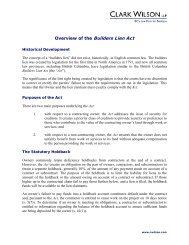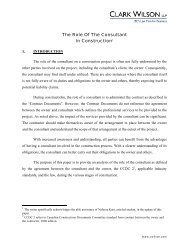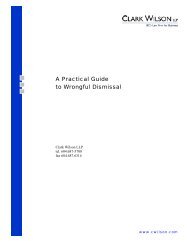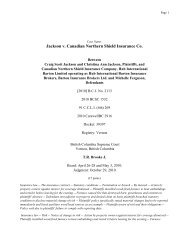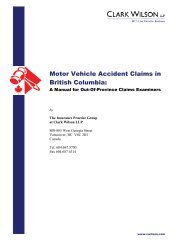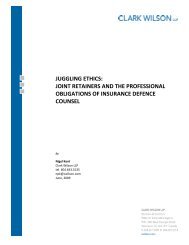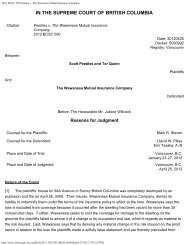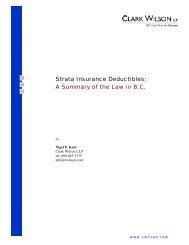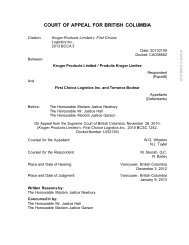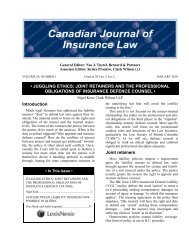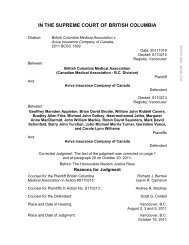AN OVERVIEW OF CONSTRUCTION CLAIMS: - Clark Wilson LLP
AN OVERVIEW OF CONSTRUCTION CLAIMS: - Clark Wilson LLP
AN OVERVIEW OF CONSTRUCTION CLAIMS: - Clark Wilson LLP
You also want an ePaper? Increase the reach of your titles
YUMPU automatically turns print PDFs into web optimized ePapers that Google loves.
p. 24<br />
1. What Is Negligence<br />
Negligence is conduct that falls below a standard established by the law for protection of others<br />
against unreasonable risk of harm. In order to prove negligence, a party must prove the<br />
following:<br />
(a)<br />
(b)<br />
(c)<br />
(d)<br />
(e)<br />
Duty of care – the party at fault owes a duty or obligation to the complainant,<br />
recognized at law, requiring that party to conform to a certain standard of<br />
conduct;<br />
Breach of the duty of care – a failure on the part of the party at fault to conform to<br />
the standard required;<br />
Causation – there is a sufficiently close causal relationship between the breach of<br />
the duty of care and the resulting loss;<br />
Foreseeability – it was reasonably foreseeable that the breach of duty of care<br />
would cause the loss; and<br />
Actual loss of damage resulted from the breach of duty of care.<br />
Negligence can arise from action or inaction. Inaction is essentially an omission, or a failure to<br />
do something which is required at common law or by the contract. Negligence also includes a<br />
failure of a party to warn another party about a defect, potential loss or danger.<br />
2. Duty of Care<br />
A duty of care exists where there is a proximate relationship between the parties, such as a<br />
contractual relationship or a fiduciary relationship.<br />
The duty owed to a contracting party exists independently from the contract and thus gives rise<br />
to a separate cause of action. The Supreme Court of Canada has discussed the interrelationship<br />
between tort and contract in these circumstances:<br />
What is undertaken by the contract will indicate the nature of the relationship that gives<br />
rise to the common law duty of care, but the nature and scope of the duty of care that is<br />
asserted as the foundation of the tortious liability must not depend on specific obligations<br />
or duties created by the express terms of the contract. It is in that sense that the common<br />
law duty of care must be independent of the contract. 41<br />
Where the cause of action is available, parties may sue in contract or in negligence or both,<br />
unless the parties have specifically contracted away part or all of the ability to sue in negligence.<br />
This latter point is important for parties to consider when entering into contracts. It is important<br />
for parties to know what duties exist at law in order to determine whether they should contract<br />
out of such duties.<br />
41<br />
Central Trust Co. v. Rafuse and Cordon, [1986] 2 SCR 147, at p. 149.<br />
© 2005 <strong>Clark</strong> <strong>Wilson</strong> <strong>LLP</strong> www.cwilson.com<br />
Samantha Ip, T. 604.643.3172




